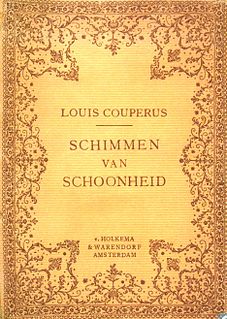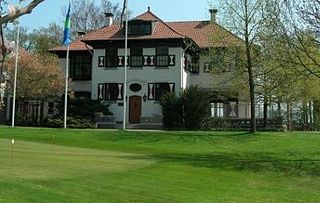Related Research Articles

Heracles Almelo is a Dutch professional football club based in Almelo, founded in 1903. The club has won the Dutch national title twice, in 1927 and 1941. Heracles won the Eerste Divisie title during the 2004–05 season, gaining promotion to the Eredivisie for the first time in 28 years. The club has remained in the top division ever since. In 2012, reached the KNVB Cup final for the first time in club history, losing to PSV in the final. The club's main rival is FC Twente.
Nederlands Dagblad is a Dutch daily newspaper, available nationwide, with a daily circulation of 23,800 issues.

Anne de Vries was a Dutch teacher and author, particularly famous in the Netherlands for his novels of regional life.

Christiaan "Chris" Arlman was a Dutch politician of the Labour Party (PvdA). During 26 years he was the mayor of four different municipalities, and the chairman of two professional football clubs. He is most noted for developing wellness tourism to Nieuweschans, being the first mayor of a united Pekela, and for expanding the sea port of Harlingen, as well as handling major budget crises at BV Veendam and Cambuur Leeuwarden.
The Letter for the King is a book by the Dutch writer Tonke Dragt, first published in 1962. A sequel, Geheimen van het Wilde Woud, was published in 1965, and a collection of follow-up short stories, Het gevaarlijke venster en andere verhalen, in 1979. De brief voor de koning was chosen as the best Dutch youth book of the latter half of the 20th century.

Winschoten is an unstaffed railway station in Winschoten in the Netherlands. It is located on the Harlingen–Nieuweschans railway between Scheemda and Bad Nieuweschans in the province of Groningen.

Schimmen van schoonheid is a collection of short stories, written by Louis Couperus and published by Van Holkema & Warendorf in 1912. It is not known how many copies were printed for the first edition, but this edition was in any case sold out by 1929. The second edition was published in 1962 by Querido in the so-called Salamander series.

Siert Bruins, also known as Siegfried Bruns and nicknamed the Beast of Appingedam, was a Dutch member of the SS and SD during World War II.

Fedde Schurer was a Dutch schoolteacher, journalist, language activist and politician, and one of the most influential poets in the West Frisian language of the 20th century.

Kortebaanschaatsen refers to an old form of Dutch ice skating tournament that goes back to the 18th century. It is not to be confused with the modern speed skating sport known as short track speed skating. The sport is similar to harness racing and is similarly setup in two straight lanes of 160 meters.
NDC Mediagroep is a Dutch publisher of newspapers, magazines, and websites focused on the three northern provinces of the Netherlands: Drenthe, Friesland and Groningen. It is owned by Mediahuis. Headquarters are in Leeuwarden, other offices in Groningen and Meppel. In addition to three main provinces, NDC publishes and distributes also in the Kop van Overijssel, Noordoostpolder, and northern Flevoland.

Hotel Des Indes is a hotel located at the Lange Voorhout in The Hague, The Netherlands. It was constructed as a mansion in 1858. In 1881, it opened as a hotel.
The WNC squat was a self-managed social centre in Groningen, the Netherlands. It was squatted in 1985 and evicted in 1990.

Jos van Manen Pieters was a Dutch writer. She wan the Athos Award in 1965.

Jeltje Haanstra was a Dutch kortebaan speed skater from Katlijk.

Henri Dekking was a Dutch journalist and writer.
Max Reisel was a Dutch semiticist and a teacher at the Montessori Lyceum Rotterdam. He strove in the dissemination of knowledge about Judaism in general and Hebrew language in particular. He played an important role in the field of education in the Netherlands.

The Noord-Nederlandse Golf & Country Club is located on the historical De Poll estate in Groningen, Netherlands. The site is known for its beauty and is covered by the Dutch national 'Natural Beauty Act' (Natuurschoonwet).

Esmée Adrienne van Eeghen was a Dutch resistance fighter in World War II. Van Eeghen is controversial because she fell in love with a German officer, but in spite of this played a significant role in the resistance, especially in Friesland, a role that would ultimately be fatal for her, due to her turbulent love life. The character Rachel Stein from the 2006 film Black Book was based on the life of van Eeghen.
References
- ↑ "Gevonden in Delpher - Nieuwsblad van het Noorden".
- ↑ Siehe Reiner Andreas Neuschäfer: Anne de Vries. Er schrieb nicht nur eine beliebte Kinderbibel. In: Idea Spezial, 2/2014, 26f.
- ↑ "Gevonden in Delpher - Nieuwsblad van het Noorden".
- ↑ "Gevonden in Delpher - de Heerenveensche koerier : Onafhankelijk dagblad voor Midden-Zuid-Oost-Friesland en Noord-Overijssel".
- ↑ ""Reis door de nacht" geeft jarenvijftigbeeld van oorlog".
- ↑ "Gevonden in Delpher - Gereformeerd gezinsblad / Hoofdred. P. Jongeling".
- ↑ "Gevonden in Delpher - de Heerenveensche koerier : Onafhankelijk dagblad voor Midden-Zuid-Oost-Friesland en Noord-Overijssel".
- ↑ ""Reis door de nacht" geeft jarenvijftigbeeld van oorlog".
- ↑ "Het nieuws uit Groningen - RTV Noord". 17 September 2018.
- ↑ 't Hart, Maarten. Een deerne in lokkend postuur, persoonlijke kroniek 1999, in het hoofdstukje '‘excursie; Wiesje'’ (pag. 191-195)